The Most Important Event In Human History! Part 1
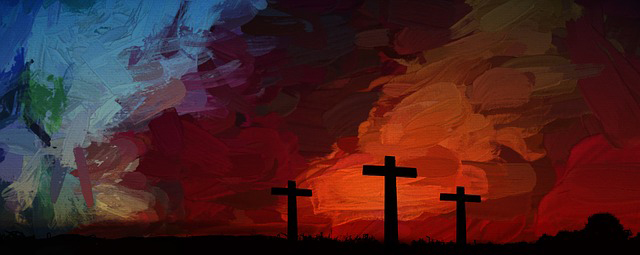
Most Christians today commemorate Yeshua’s atoning sacrifice on the cross and His resurrection with the Easter holiday. I was raised thinking Easter was the day when Christ died for our sins and was then resurrected. I’ll be perfectly honest in the fact that as a child, I was more focused on Easter baskets full of goodies, egg hunts and a new Easter dress to wear to church. As a young parent, I still wanted the fun of Easter for my children, but I also felt that I wanted them to realize the importance of this celebration, so I would always get them some sort of spiritual gift to put in their Easter basket to remind them of Christ. It wasn’t until a few years ago that I started learning about God’s Holy Days that I came to learn that Easter has nothing to do with Christ, His sacrifice and resurrection. I will not get into it at this time because it is a big subject, but Easter is actually a celebration originating in pagan traditions and beliefs. You can verify this by researching the origins of Easter. The word “Easter” is only found in the King James Version of the Bible in one verse (Acts 12:4). If you go back to the translation, you will see that the word for Easter was originally “pascha” which means Passover. If you would like a video to start your research about Easter and other pagan holidays, I found this one very helpful. It’s called, “Truth or Tradition-Jim Staley https://www.youtube.com/watch?v=FqomQ4fF7s0&list=PLgYz4DCUTkPkfw15YaQulVGxhqR9PnSYC&index=2
God’s Holy Days of Passover, The Feast of Unleavened Bread and First Fruits are the actual days that we should be remembering Yeshua’s sacrifice for us and His resurrection. These Holy Days (not holidays) are what God commanded His people to keep. In this post I will be discussing the Passover and in Part 2, I will discuss The Feast of Unleavened Bread and First Fruits.
Passover
Numbers 9:2-3 “Let the children of Israel keep the Passover at its appointed time. On the fourteenth day of this month, at twilight, you shall keep it at its appointed time. According to all its rites and ceremonies you shall keep it.”
NKJV
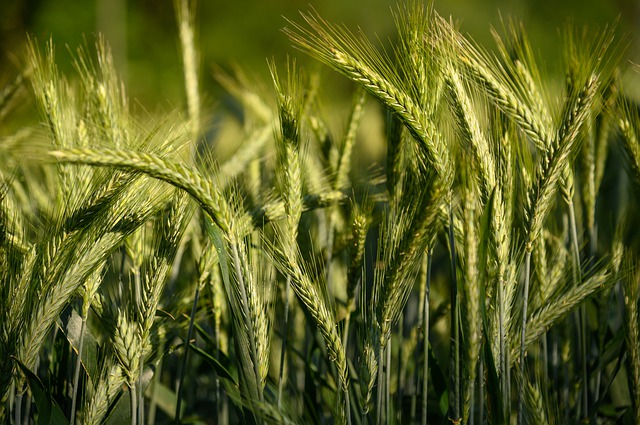
Passover was to be kept in the first month of God’s calendar when the barley was ripe. This was called the month of Abib which means newly ripened grain. If the barley was found to be ripe after the 12th month and at the first sliver of the moon (which began the next month) then that was the beginning of the new year and was called the month of abib. If the barley was found to not be mature enough then a 13th month was proclaimed for that year and the next month would start the new year when the barley was ripe. The importance of the barley being ripe is because it was needed to harvest a sheaf for the wave offering at The Feast of First Fruits which I will discuss in Part 2 of this post.
Deut. 16:1 Observe the month of Abib, and keep the Passover to the LORD your God, for in the month of Abib the LORD your God brought you out of Egypt by night.
NKJV
We first officially learn about Passover when God, Yehovah, declared the captive Israelites to keep it on the night that the tenth plague on Egypt commenced, which was the final straw that led Pharoah to let the Israelites go. After 400 years of bondage, the Israelites were delivered by their God. The Passover is very symbolic of the Messiah in all aspects and pointed to His future coming. The fall of Adam and Eve put all mankind into bondage of sin and death. God through His Son, Yeshua the Messiah is the only one who saves us from sin and death.
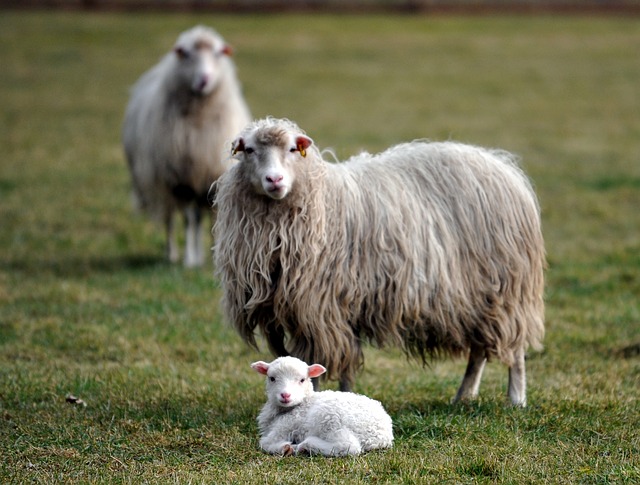
The ancient Israelites were told to take a one year old male lamb without blemish and kill it then take the blood of that lamb and strike it over the lintel (top of the door frame) and posts of the door using a hyssop branch. In Biblical times, the Israelites would build a depression or basin on the threshold of the door to their homes. The purpose of this basin was soley for the Passover sacrificial blood. They would pour the lamb’s blood in the basin then use a hyssop branch to strike the posts and lintel with the blood thereby the entrance to their home was surrounded on all sides with the blood of the lamb. The blood provided protection for the Israelites from the destroying angel that God was going to send to take the lives of all the first born in Egypt. The destroying angel would ‘pass over’ all who had the blood of the lamb on their door frame. The symbolism of the one year old male lamb without blemish is easy to see in that it points to Yeshua, who was called the Lamb of God. He never sinned, He was male, and His ministry lasted a year from one Passover to another when He was then sacrificed on a cross for our sins as our Passover Lamb.
John 1:29 The next day John saw Jesus coming toward him, and said, “Behold! The Lamb of God who takes away the sin of the world!
NKJV
John 10:7-10 Then Jesus said to them again, “Most assuredly, I say to you, I am the door of the sheep. All who ever came before Me are thieves and robbers, but the sheep did not hear them. I am the door. If anyone enters by Me, he will be saved, and will go in and out and find pasture. The thief does not come except to steal, and to kill, and to destroy. I have come that they may have life, and that they may have it more abundantly.
NKJV
It is through Yeshua that we are saved because a sin offering can only be made with innocent blood and Yeshua was the only perfect and sinless one who qualified as our substitute. It is through the door that we find life. What is symbolic about striking the blood of the lamb over and around the door? By spiritually applying Yeshua’s blood atonement to our lives, we can be saved from the bondage of sin and death. The heart can be thought of as the door to the soul. When we turn our heart to God and His will in our lives and turn away from the natural man’s will, our heart is softened and humble and desires to follow God and Yeshua.
Rev. 3:20 Behold, I stand at the door and knock. If anyone hears My voice and opens the door, I will come in to him and dine with him, and he with Me.
NKJV
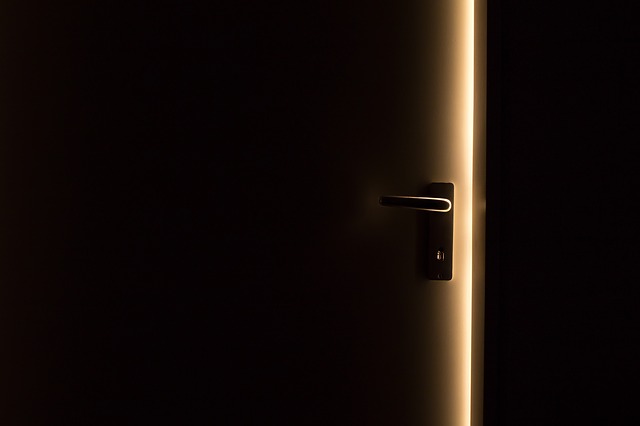
The door Yeshua is knocking at is your heart and my heart. He wants us to let Him in. When we apply the blood of His atonement to our heart, it means that we have faith that He will save us from sin and spiritual death. We open our heart to His teachings, doctrines and commandments and desire to follow Him in all things. It is God’s mark upon us, distinguishing us from the world (Egypt). The world has it’s own mark from the one that they follow–Satan. His mark is referred to as the mark of the Beast.
The hyssop plant, used to strike the blood on to the lintels and posts, was used during Yeshua’s crucifixion. In Biblical times the hyssop plant was used medicinally and for cleansing. The Israelites used it along with blood, in the cleansing and purification of lepers and houses.
Psalm 51:7 Purge me with hyssop, and I shall be clean;
NKJV
Wash me, and I shall be whiter than snow
John 19:28-30 After this, Jesus, knowing that all things were now accomplished, that the Scripture might be fulfilled, said, “I thirst!” Now a vessel full of sour wine was sitting there; and they filled a sponge with sour wine, put it on hyssop, and put it to His mouth. So when Jesus had received the sour wine, He said, “It is finished!” And bowing His head, He gave up His spirit.
NKJV
The striking of the hyssop plant on to the lintel and posts of the door symbolizes the scourging of Yeshua who was struck over and over with a whip causing His flesh to rip and tear and bruise. This was no ordinary whip that one might picture. It was a terrible torture device called a flagrum that resembled a whip but attached to it’s many leather cords were things such as broken bone, heavy balls of lead, and sharp pieces of lead. Many people who were scourged died from it in Biblical times. It is also significant that Yeshua drank of sour wine from the sponge. This points to Him drinking the bitter cup of God that was intended for us to drink because of our sins, but Yeshua drank that bitter cup for us.
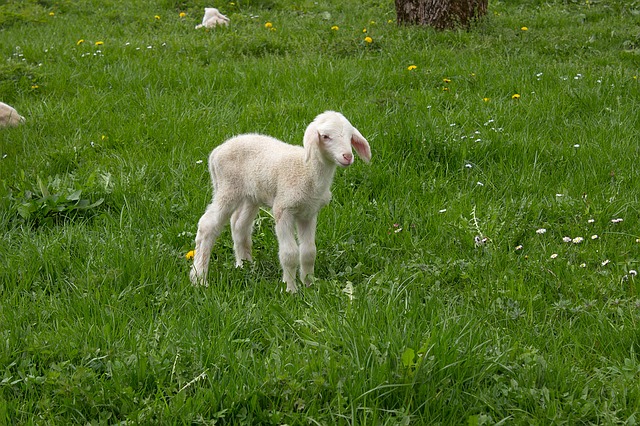
Besides being one year old, without blemish and male, the lamb also had to be examined for four days from the selection to the sacrifice to be sure that it was without blemish. Also none of it’s bones were to be broken and it had to be slain in public. Yeshua fulfilled all these requirements. He was scourged and slain in public and none of His bones were broken even though both men being crucified beside Him had their legs broken. He was also examined for four days. Four days before Passover, the High Priest would travel to Bethlehem and select the perfect lamb to be a sin offering for all the people. It was this particular lamb that would be slain last at the temple for all Israel. Each family was also to select a lamb of their own and tie it up at their home for inspection also. They would name their lamb, love it and become attached to it. This made having to sacrifice it a true sacrifice for them. While the High Priest was gone selecting a lamb, the people in Jerusalem would begin to gather and be ready with palm branches along the road in Jerusalem from the city gate that led up to the temple and they would wait for his return. Several priests would wait outside the city gate and when the High Priest was spotted with the lamb, they would signal to the people that he had arrived and the people would begin waving their palm fronds, throwing their garments into the street and shouting, “Hosanna in the highest! Blessed is he that comes in the name of the LORD!” The High Priest would travel up the temple mount to the temple with the lamb then tie the lamb up to a post in the temple courtyard where he would be inspected by all for the next four days. This event was something that the Israelites had done for hundreds of years previously. This day that Yeshua made His triumphal entry was THE day that they had been rehearsing for and yet most didn’t even recognize it.
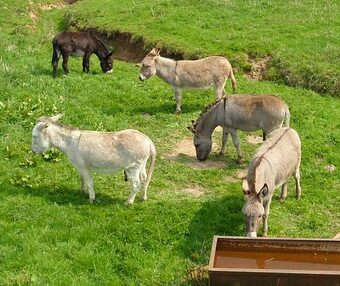
Zech. 9:9 “Rejoice greatly, O daughter of Zion!
NKJV
Shout, O daughter of Jerusalem!
Behold, your King is coming to you;
He is just and having salvation,
Lowly and riding on a donkey,
A colt, the foal of a donkey.
Unknown to the religious leaders of that day, Yeshua had made plans to ride in before the High Priest and had instructed His disciples to acquire a special colt for His triumphal entry into Jerusalem. This was a clear sign in ancient Israel of kingship and Yeshua did this openly in front of everyone. When Yeshua neared the city gate riding the colt, His disciples gave the first shout which triggered the people in the city to begin shouting and waving their palm fronds. The religious leaders clearly saw that this was not the High Priest with the lamb so they tried frantically yet unsuccessfully to quiet the crowd. Imagine trying to quiet thousands of shouting people! It just wasn’t going to happen. What they didn’t realize was that Yeshua was THE High Priest and that He was THE Lamb of God that would be sacrificed for the sins of all mankind. Yeshua made His way up the temple mount and entered the temple, cleansing it one more time, then He spent the next three days teaching in the temple. During these three days of preaching, the religious leaders came every day and tried their best to trap Yeshua in His words, however, they could not do it no matter how hard they tried. Yeshua was “inspected” by these religious leaders and the people during these three days.
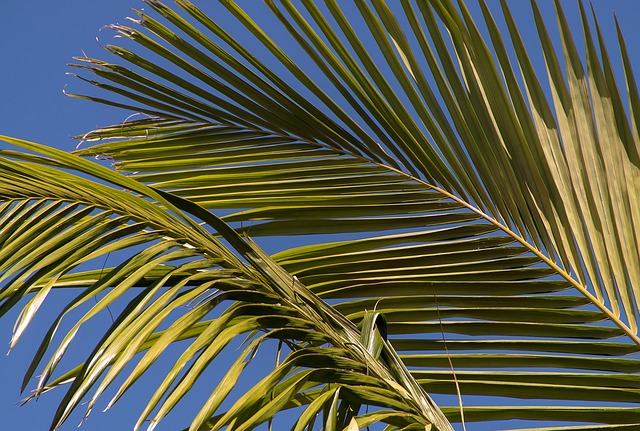
On the evening of the third day of His inspection was when the last supper occurred where He was betrayed by Judas and when He went to the Garden of Gethsemane. It was here that the sins of the world were transferred upon Yeshua. It was here that Yeshua first felt the intense enormity of what He had volunteered to do for humanity. Under the incredible weight and pain (physical, mental, spiritual and emotional) of this burden placed upon Him, He begged the Father to let there be another way but then submitted to the Father’s will to go through with it. The Garden of Gethsemane was full of olive trees which are full of symbolism in the Bible. It was an olive branch that was brought back to Noah by the dove. Olive oil is used to light the lamps in God’s Holy Temple. The olive trees were essential to the ancient Israelites for food, medicine, anointing oil, lamp oil, sacrificial oil and wood for furniture. Yeshua is referred to as an olive branch. Gethsemane literally means olive press. Yeshua was pressed upon when the sins of the world were placed upon Him. He was pressed down like an olive being pressed for it’s oil. In the agony of this unfathomable load, Yeshua kept praying earnestly for strength to accomplish His mission. In Luke 22:44 it states that, “His sweat became like great drops of blood falling down to the ground.” I do not wish to take away from the suffering that Yeshua went through because no one can even imagine what He went through for us all, and I know that most people believe that Yeshua sweated actual blood, however, it says that “His sweat became LIKE great drops of blood.” This is a simile and is simply comparing His sweat to “great drops of blood falling down to the ground.” If Yeshua had actually sweat blood then don’t you think He would’ve been covered in blood and had bloody clothes? If He was in that sort of state then don’t you think His disciples would’ve said something and been a bit shocked by the sight of Him. Something like that surely would’ve been mentioned by at least one of the writers of the four Gospels. I admit that I do not have factual evidence for this but neither do we have factual evidence that He sweat blood so I am simply stating my opinion on this matter. I could very well be wrong or right. Anyway, it was simply an observation.
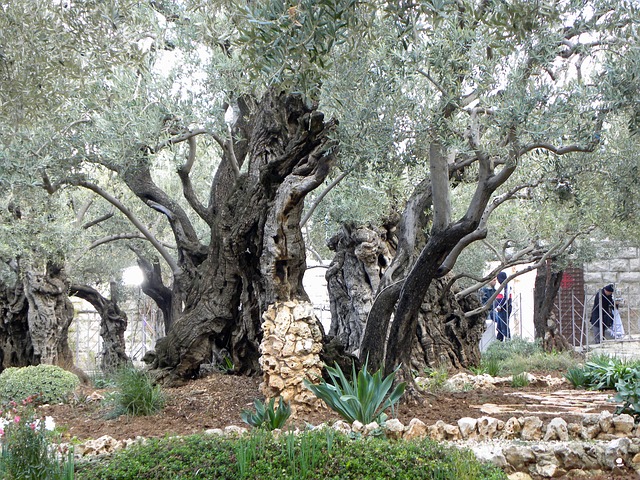
Growing up in Mormonism, I was taught that the Garden of Gethsemane was the most important part of Yeshua’s atonement. Mormons believe that it was in the Garden of Gethsemane that the atonement for all sin took place and after that, the crucifixion was just a secondary role where He surrendered His life on the cross. About 3 years ago my spouse and I attended a marriage retreat sponsored by the LDS Church and the speaker asked the audience several questions for us to answer on a piece of paper. One question dealt with Yeshua’s atonement. He showed the audience 6 paintings of Yeshua. Three were of Him on the cross and three were of Him suffering in the Garden of Gethsemane. He asked us to pick one that we would hang in our home that most depicted the atonement for us personally. There were about 200 people in the audience and every person except 2 people picked a painting of the Garden of Gethsemane. I happened to be one of the 2 that picked a painting of Yeshua on the cross. It was during this time that I was pulling away from the LDS Church and really studying the Bible and Yeshua’s life and teachings. Anyway, members of the LDS Church do not consider the cross to be as significant as the Garden of Gethsemane.
In a conference speech in 1953, Marion Romney, who was then a member of the LDS First Presidency, stated, “Jesus then went into the Garden of Gethsemane. There he suffered most. He suffered greatly on the cross, of course, but other men had died by crucifixion; in fact, a man hung on either side of him as he died on the cross. But no man, nor set of men, nor all men put together, ever suffered what the Redeemer suffered in the garden. He went there to pray and suffer’” (Conference Report, October 1953, Pg.35). Another quote that demonstrates that Mormons teach that the Garden of Gethsemane was the most important part in Yeshua’s atonement comes from a Sunday School teacher’s manual. It instructs teachers to, “Draw a priority chart with 1st, 2nd, 3rd across the top and A (cross), B (garden), and C (washing) down the side….Let A represent Christ hanging on the cross, B his suffering in the garden of Gethsemane, and C Christ washing the feet of the apostles….have the students rank the events first, second and third in order of their feelings for Christ’s greatest act of love. Have them show their decision by raising their hands. Count the number of hands raised and write it in the correct box on the priority chart. It is important that the students understand that Christ’s greatest act of love was shown when he suffered for the sins of the world in the garden of Gethsemane.” (Introduction to the Scriptures, Part B [Sunday School Course 13 teacher’s manual] (Salt Lake City, Utah: The Church of Jesus Christ of Latter-day Saints, 1980), p. 56).
The Garden of Gethsemane is only mentioned twice in the Bible and yet the importance of the cross is spoken of countless times. I have come to learn that it was in the garden that the sins of the world were pressed upon Yeshua. Yes, He suffered in the garden but that wasn’t the end of His suffering. He carried that colossal weight upon His shoulders all the way from the garden to the cross! It was on the cross that the sacrificial atonement actually happened because it is through a blood sacrifice that a sin offering is made. It was not through suffering that the innocent lambs atoned for the people, but by death. The innocent, perfect lambs had to die in order for an atonement to be made. That’s how it was done. Yeshua was THE Lamb who had sin pressed upon Him so that sin could be nailed to the cross. He suffered the consequence of death for us because of sin. He did not deserve any of it because He was perfect! We were the ones who deserved death and suffering but He became our substitute. He took my place and your place! Yeshua did not drink the bitter cup in the Garden of Gethsemane but on the cross.
John 18:11 So Jesus said to Peter, “Put your sword into the sheath. Shall I not drink the cup which My Father has given Me?”
NKJV
We can see from this scripture in John that Yeshua had not yet drunk the bitter cup from The Father.
Gal. 6:14 But God forbid that I should boast except in the cross of our Lord Jesus Christ, by whom the world has been crucified to me, and I to the world.
NKJV
After being betrayed by Judas in the garden, Yeshua was taken by the religious leaders where He was questioned, beaten, mocked, ridiculed and spit upon. He was then taken to Pilate, Herod then Pilate again for questioning. Pilate repeatedly stated that he found nothing about Yeshua that warranted death as the religious leaders were insisting upon. This was the fourth and final day of inspection before Yeshua was sent to be crucified. Pilate declared that Yeshua was innocent and did not deserve death but the Jewish religious leaders were vehemently insisting that He deserved to die according to their laws. These religious leaders felt threatened by Yeshua and feared that He would take away their way of life, power and authority. Yes, Yeshua had broken many of their laws, but they were man-made laws not God’s laws. Yeshua had come to live God’s law fully and perfectly and to expose the man-made religion that had crept into the Israelites culture. He had constantly preached God’s laws found in the Old Testament and proclaimed His Father’s name to all. His ministry was about opening not only the physically blind eyes of the people, but also the spiritually blind eyes to see the good news of the Gospel found in the Old Testament. The religious leaders were so caught up in their man-made religion and their hearts were so hard from pride and self-righteousness that they were blind to the fact that the long prophesied Messiah was standing right before them!
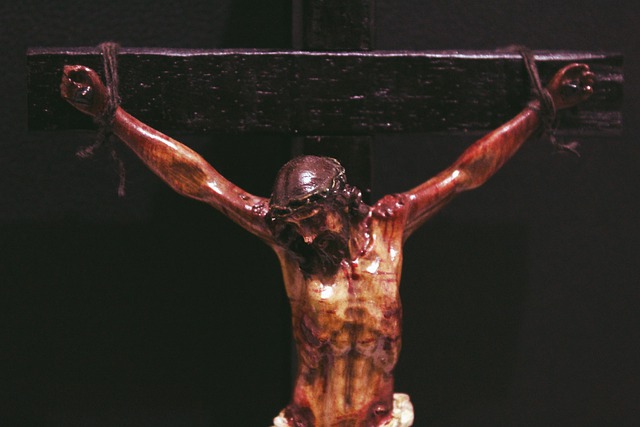
Pilate decided to have Yeshua scourged thinking that that might be enough of a punishment to satisfy the Jewish religious leaders so as to turn them from their desires for Yeshua to be killed. So Yeshua was brought to a post and tied to it just like the lamb in the temple courtyard was tied to a post for inspection. Yeshua was then violently whipped. His flesh was torn to pieces and His body bruised by the torturous flagrum whip used by the Romans against the vilest of criminals. Most depictions of Yeshua on the cross show Him with only a few cuts and scrapes but in reality, He was beaten to a bloody pulp from head to toe. Another point that I didn’t previously realize was that the Romans would also strip their victims completely naked because they enjoyed completely humiliating their victims. After the scourging, He was then crowned with thorns and given a purple scarlet robe and taken back to Pilate who presented Him to the religious leaders once again. This crown of thorns goes back to when Abraham was asked to sacrifice his son Isaac and when the Angel of the LORD intervened, a male ram was provided for the sacrifice. Abraham found it caught in a thicket of thorns. Much to Pilate’s dismay, the site of Yeshua’s scourged body did not appease the religious leaders and they cried even more for Him to be crucified. Pilate then gave them a choice that he thought would surely get Yeshua off the hook because he recognized that the religious leaders were doing this out of spite and envy. Pilate had a tradition to release a prisoner to the people at Passover. He chose one of the most notorious prisoners called Barabbas, who was in prison for murder and rebellion, thinking that surely they will not choose this man over Yeshua, who was innocent in his eyes. However, the religious leaders were filled with hatred for Yeshua so much that they called for Barabbas to be released. This is symbolic because we are Barabbas. We are the rebellious sinners who are guilty and deserve death. Yeshua was the innocent one! And yet we are freed because Yeshua remained to die in our place. Barabbas literally means “son of the Father”. Does God our Father not desire for us to be called His sons and daughters? He wants us to be able to come back to His presence and to have a relationship with Him. This can now happen because Yeshua paid the price for us to be able to do this!
Pilate caved once they mentioned that he would not be a friend to Caesar if Yeshua was permitted to live since Yeshua had proclaimed himself king and the religious leaders lied that He would go against Caesar. This was a manipulative lie on the part of the religious leaders to get Pilate afraid of not staying in the good graces of Caesar if He were to let Yeshua go. So Pilate washed his hands of Yeshua’s innocent blood and allowed Yeshua to be taken away to be crucified. Many people believe that Yeshua had to carry the entire cross to Golgotha but that would’ve been impossible because it would’ve weighed hundreds of pounds. For crucifixions, the main poles were left buried in the ground and only the crossbeam was to be carried. At this point, Yeshua was in a dreadful condition due to the Roman scourging which in and of itself killed many. It was about 9:00 a.m. when Yeshua was nailed to the cross in between two criminals. The Romans were known for their barbaric, torturous and humiliating crucifixions and they liked to do it publicly and put the perpetrators on public display, therefore the crosses were placed on a busy road entering Jerusalem. It was on this very day that thousands of people were coming into Jerusalem with their lambs to have them sacrificed at the temple for the Passover meal that evening. Yeshua, our Passover Lamb, hung there suffering as people passed by. Many of them mocked and ridiculed Him and I’m sure many of them simply hurried on by to complete their duty. The Israelites had been rehearsing this rite of sacrificing a lamb at Passover time for years and years and unfortunately they missed the symbolism of it. They missed what it was pointing to! They had fallen into a state of merely going through the motions and their faith had become lost to ritualistic repetition and legalistic attitudes. This was the very moment in time that Passover pointed to that was being accomplished before their very eyes and the majority of them were blind to it all! How tragically ironic!
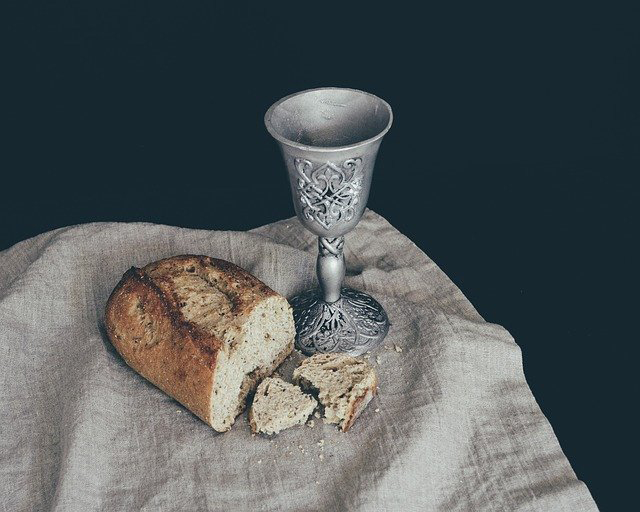
Contrary to what many Christians believe, including Mormons, the last supper that Yeshua ate with His disciples the night before was not the Passover meal. There is much evidence for this in the New Testament. First of all Judas left early in the evening and the other disciples didn’t seemed concerned about where he went. They thought Yeshua had sent him out to buy some things for the feast. If this was the Passover meal then why would Judas be buying things for it. If you understand the Passover and The Feast of Unleavened Bread then you know this could not have been the Passover meal they were eating because once the Passover meal begins at sunset then it becomes what’s called a High Sabbath. All God’s Holy Days are special Sabbath Days to be observed like the regular Sabbath because they are set apart. They are called High Sabbaths and occur any day of the week on which a Holy Day happens to fall unlike the regular Sabbath which always occurs Friday sunset to Saturday sunset. So if that evening of the last supper was Passover/The Feast of Unleavened Bread then it would’ve been a High Sabbath and no one buys things once the sun has set. Also being Passover, they were to stay inside their homes and not go out because that is what happened with the ancient Israelites during the first Passover meal. They were instructed to stay inside and lock their doors while the destroying angel came through Egypt to slay all firstborns in those homes where the lambs blood did not mark the doors. So there seemed to be no concern that Judas left. Then later, Yeshua and those disciples with Him that evening, went out and walked around and went to the Garden of Gethsemane. We also see a group of religious leaders and temple officers that came and arrested Yeshua and took him to the house of Caiaphas to be questioned by many of the religious leaders. If this had been the night of the Passover then none of these people would be out and about. They would’ve been home partaking of Feast of Unleavened Bread which included the Passover lamb.
Yeshua was questioned through the night and into the morning then taken to Pilate early in the morning which was the Preparation Day of the Passover. Yeshua was questioned by Pilate in the Praetorium and the Jewish religious leaders believed that they would be defiled for the Passover if they set foot inside a heathen structure, therefore they stayed just outside while Pilate questioned Yeshua inside. Pilate would have to go back and forth from Yeshua who was inside to the religious leaders who were outside.
John 18:28 Then they led Jesus from Caiaphas to the Praetorium, and it was early morning. But they themselves did not go into the Praetorium, lest they should be defiled, but that they might eat the Passover.
NKJV
John 19:14-15 Now it was the Preparation Day of the Passover, and about the sixth hour. And he said to the Jews, “Behold your King!” But they cried out, “Away with Him, away with Him! Crucify Him!”
NKJV
Another piece of evidence that the last supper was not the Passover meal was that Nicodemus and Joseph of Arimathea sought to be able to take Yeshua’s body for burial quickly before the sun set that evening because that evening was the actual Passover/Feast of Unleavened Bread meal.
John 19:31 Therefore, because it was the Preparation Day, that the bodies should not remain on the cross on the Sabbath (for that Sabbath was a high day), the Jews asked Pilate that their legs might be broken, and that they might be taken away.
NKJV
It was in accordance to the law in the Bible that dead bodies were not to be left hanging overnight. That is why the soldiers broke the legs of the two criminals so that they would die more quickly so as to take them down before the High Sabbath of Passover began at sunset.
Deut. 21:22-23 If a man has committed a sin deserving of death, and he is put to death, and you hang him on a tree, his body shall not remain overnight on the tree, but you shall surely bury him that day, so that you do not defile the land which the Lord your God is giving you as an inheritance; for he who is hanged is accursed of God.
NKJV
Yeshua’s legs were not broken by the Roman soldiers because He was already dead, but just to be sure, Yeshua’s side was pierced with a spear and out gushed water and blood. This fluid that had built up in Yeshua’s lungs and around His heart is a condition called hypovolemic shock caused by the trauma and blood loss from the Roman scourging. This piercing of His side is very significant and I cannot begin to explain it well enough. To understand the significance of this, I refer you to a youtube series by Michael Rood called, “The Great Secret of Solomon’s Temple” and another youtube video called, “Revealing God’s Treasure – Ark of the Covenant – Found” by Ron Wyatt. They both discuss one of the most important archeological discoveries ever. https://www.youtube.com/watch?v=bYIwjYN4JVo&list=PLgYz4DCUTkPmC6xrFswSrd92qGslpUQls&index=5
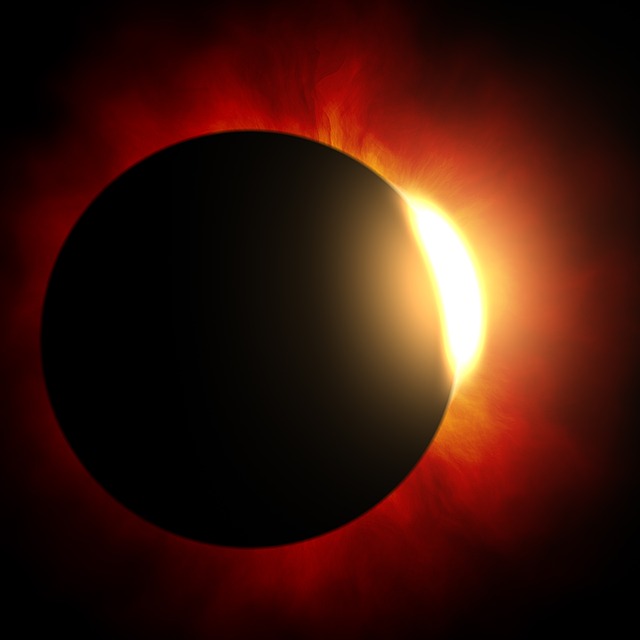
The Gospels of Matthew, Mark, Luke and John do not give every single detail. Each Gospel writer remembered and wrote down certain things that some of the others did not. We have to read all of them in order to get a more complete picture of what happened. Yeshua hung on the cross from about 9 a.m. to 3 p.m. which was when He took His last breath and committed His spirit of the Father. Around noon, it grew dark then at 3 p.m. (the ninth hour for the Israelites), the sun was darkened and after Yeshua died there was a great earthquake where rocks were split and graves were opened and the temple veil was torn in two from top to bottom. Yeshua’s last words are included in the following scripture passages.
Luke 23:44-46 Now it was about the sixth hour, and there was darkness over all the earth until the ninth hour. Then the sun was darkened, and the veil of the temple was torn in two. And when Jesus had cried out with a loud voice, He said, “Father, ‘into Your hands I commit My spirit.’ ” Having said this, He breathed His last.
NKJV
John 19:30 So when Jesus had received the sour wine, He said, “It is finished!” And bowing His head, He gave up His spirit.
NKJV
Matt 27:45-53 Now from the sixth hour until the ninth hour there was darkness over all the land. And about the ninth hour Jesus cried out with a loud voice, saying, “Eli, Eli, lama sabachthani?” that is, “My God, My God, why have You forsaken Me?” Some of those who stood there, when they heard that, said, “This Man is calling for Elijah!” Immediately one of them ran and took a sponge, filled it with sour wine and put it on a reed, and offered it to Him to drink. The rest said, “Let Him alone; let us see if Elijah will come to save Him.” And Jesus cried out again with a loud voice, and yielded up His spirit. Then, behold, the veil of the temple was torn in two from top to bottom; and the earth quaked, and the rocks were split, and the graves were opened; and many bodies of the saints who had fallen asleep were raised; and coming out of the graves after His resurrection, they went into the holy city and appeared to many.
NKJV
It is interesting to note that during the day, the High Priest and other priests were sacrificing lambs in the temple. According to Jewishencyclopedia.com the Passover lamb was to be killed around 3-5 pm on the 14th day of the first month. They had thousands of lambs to kill for all the many families, so they would start early so that they could make sure to kill the last lamb between 3-5 pm thereby leaving enough time to prepare the lamb for roasting before sunset. The last lamb was the one that the High Priest had chosen and tied to the post in the temple courtyard. This was to be the sacrifice for all the people whereas the individual family lambs were for the individual families. After the sacrifice of the final lamb, the High Priest would cry out, “It is finished!” It is believed that this final lamb was sacrificed around 3:00 pm that year, right when Yeshua cried out, “It is finished!”
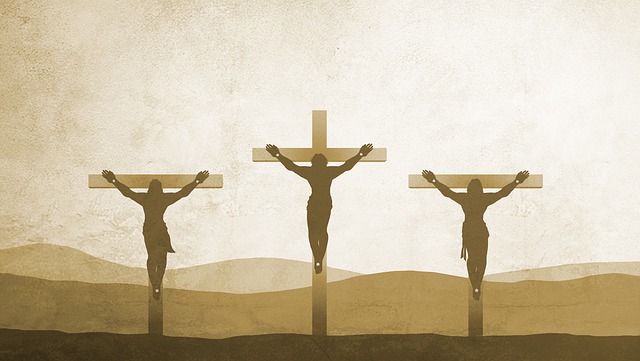
When Yeshua hung on the cross, He also spoke these words, “My God, My God, why have You forsaken Me?” Many people, including the LDS members, think that God actually forsook Yeshua. Mormons believe that Yeshua had to go through this event by Himself in order for it to be valid. Many others look to what it says in 2 Cor. 5:21 “For He made Him who knew no sin to be sin for us, that we might become the righteousness of God in Him.” They believe that since Yeshua was made into sin that God could not be with Yeshua any longer because sin cannot dwell in God’s presence, but this doesn’t make sense because God doesn’t forsake us when we sin. We are not in His presence here on Earth. God desires to help us through our trials and to draw us near to Him so that we can come to know the truth and return to His presence some day. So why did Yeshua speak those words? What did it mean? Well, throughout all His ministry, Yeshua taught from God’s word, the holy scriptures. He frequently said, “It is written…” This refers to what was written in the Old Testament which is God’s law. The phrase He spoke on the cross is the first line from Psalm 22 which is a Messianic psalm. All the religious leaders and many of the Jewish people who heard Him say this, would’ve recognized this as being from Psalm 22. Yeshua was declaring to them that He was the Messiah and that Psalm 22 was being accomplished by Him at that moment. What a powerful message! I also truly believe that the reason why this psalm begins this way is because Yeshua had human emotions and feelings like we do. When we are in our darkest hours, do we not also question God, asking Him why He has left us? We feel despair and hopeless but has God really left us? No, He will never leave us. He is always there when we need Him. When we are at rock bottom in life, we must not give up and lose faith, we must remember God loves us and even though we may feel abandoned, He is there. We must trust Him that He knows what we need and when we need it! I love that in the middle of the psalm, it states, “You have answered Me.” This is significant because God answers us after our trial of faith. He lets us grow in faith. God always hears us, however, He knows best when to answer.
Ps. 22:1-31 My God, My God, why have You forsaken Me?
NKJV
Why are You so far from helping Me,
And from the words of My groaning?
O My God, I cry in the daytime, but You do not hear;
And in the night season, and am not silent.
But You are holy,
Enthroned in the praises of Israel.
Our fathers trusted in You;
They trusted, and You delivered them.
They cried to You, and were delivered;
They trusted in You, and were not ashamed.
But I am a worm, and no man;
A reproach of men, and despised by the people.
All those who see Me ridicule Me;
They shoot out the lip, they shake the head, saying,
“He trusted in the LORD, let Him rescue Him;
Let Him deliver Him, since He delights in Him!”
But You are He who took Me out of the womb;
You made Me trust while on My mother’s breasts.
I was cast upon You from birth.
From My mother’s womb
You have been My God.
Be not far from Me,
For trouble is near;
For there is none to help.
Many bulls have surrounded Me;
Strong bulls of Bashan have encircled Me.
They gape at Me with their mouths,
Like a raging and roaring lion.
I am poured out like water,
And all My bones are out of joint;
My heart is like wax;
It has melted within Me.
My strength is dried up like a potsherd,
And My tongue clings to My jaws;
You have brought Me to the dust of death.
For dogs have surrounded Me;
The congregation of the wicked has enclosed Me.
They pierced My hands and My feet;
I can count all My bones.
They look and stare at Me.
They divide My garments among them,
And for My clothing they cast lots.
But You, O LORD, do not be far from Me;
O My Strength, hasten to help Me!
Deliver Me from the sword,
My precious life from the power of the dog.
Save Me from the lion’s mouth
And from the horns of the wild oxen!
You have answered Me.
I will declare Your name to My brethren;
In the midst of the assembly I will praise You.
You who fear the LORD, praise Him!
All you descendants of Jacob, glorify Him,
And fear Him, all you offspring of Israel!
For He has not despised nor abhorred the affliction of the afflicted;
Nor has He hidden His face from Him;
But when He cried to Him, He heard.
My praise shall be of You in the great assembly;
I will pay My vows before those who fear Him.
The poor shall eat and be satisfied;
Those who seek Him will praise the LORD.
Let your heart live forever!
All the ends of the world
Shall remember and turn to the LORD,
And all the families of the nations
Shall worship before You.
For the kingdom is the LORD’S,
And He rules over the nations.
All the prosperous of the earth
Shall eat and worship;
All those who go down to the dust
Shall bow before Him,
Even he who cannot keep himself alive.
A posterity shall serve Him.
It will be recounted of the LORD to the next generation,
They will come and declare His righteousness to a people who will be born,
That He has done this.
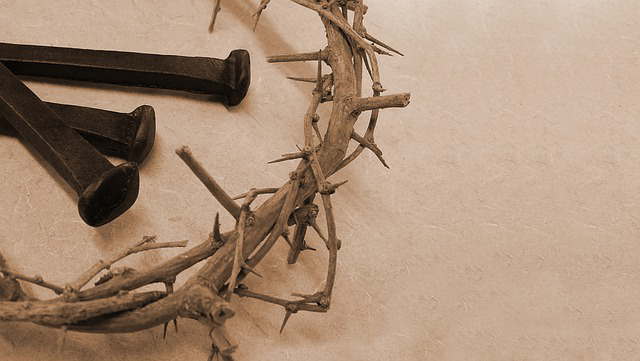
As I read this Psalm, it brought tears to my eyes about the significance and sacrifice of Yeshua’s life and death. What He did for me and you and all who would hear Him and follow Him, cannot be sufficiently described into words. Our salvation hinged upon Yeshua’s sacrificial atonement and His resurrection. We would be lost and overcome by sin and death if this event had not taken place! It truly was the most important event in human history!
Note: I do not know everything there is to know about the Passover and Yeshua’s final week, His atonement and resurrection. I have shared with you a lot of what I have come to learn. I know there is much more to it and I learn something new all the time. I hope that something in this post has touched your heart and helped you appreciate the magnitude of Yeshua’s sacrifice and helped you gain a greater love for Him. If you would like to learn more details, The Sword of YHVH Ministries has a fantastic series called “Gethsemane to Golgotha (The Chronological Gospels)” that you can watch and listen to on youtube. To be continued until the next post.